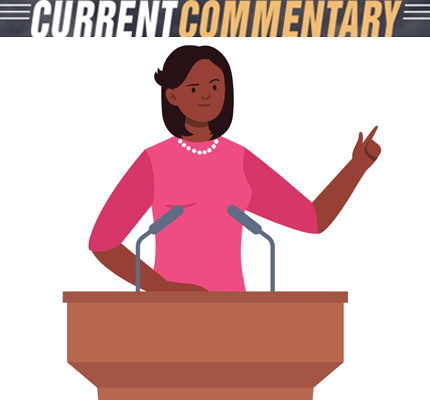
Madam Vice President Will Surface Soon: But How? And to What Rhetorical Effect?
By Nichola D. Gutgold, Ph.D.
A first impression may set the tone for an entire relationship. In politics, that first impression is likely to emerge from a candidate’s announcement speech. No matter what your politics are, let’s agree: we need more political parity for women in the United States. Even with big mid-term wins for women in 2018, only one-quarter of the members of Congress are women. And, I don’t need to tell you that in the United States of America, we have yet to elect a woman president. We came very close in 2016, and twice before we have had women vice-presidential candidates—Geraldine Ferraro in 1984 and Sarah Palin in 2008.
The nomination of Congresswoman Geraldine Ferraro remains the only lasting achievement of the Mondale campaign. But the press consistently wondered if she would be “tough enough” to push the nuclear button.1As if to answer the question of toughness, Sarah Palin was described as a mother of five and a moose-hunter. Regardless, both ran on losing tickets.
Now we are about to hear about which woman will be named the vice-presidential candidate on the Joe Biden presidential ticket. So much of politics centers around effective communication. How the announcement of this vice-presidential candidate takes place, both by Biden and the candidate herself, as well as the candidate’s subsequent communication abilities, will make or break her impact and effectiveness.
In Political Campaign Communication: Principles and Practices, the widely cited book by Judith Trent et al. (2011), the functions and merits of announcement speeches are discussed within the context of a candidate's campaign and their potential term in office. Candidates are often trying to signal to voters that they are like the voters themselves, and that they care about the same issues that voters care about. This vice-presidential candidate’s first statement, along with her big convention speech (likely to be virtual because of the virus), will be her surfacing not only as Biden’s running mate, but as a likely presidential contender herself. A woman who is an effective campaigner on television and on social media will be key in the age of campaigning during Covid-19 because she likely will not have the number of in-person campaign events she would have if the country were not social distancing.
Who this woman is and how the country perceives her is important—if Biden wins the election, his choice will make history as the United States’ first woman vice president. Rhetorically, her selection will remind Americans that presidential politics can and should include women. I believe whoever she is will have a clearer pathway to the U.S. presidency than any woman previously has had.
Six women vied for the Democratic presidential nomination in 2020, and one of the constraints that held them back was the question of electability. One of the major hurdles to electing a woman president has been that voters simply cannot picture a woman in executive leadership. We have to see a woman in the Oval Office, but vice president is as close as you can get to being president without being president. The more presidential her rhetoric, the more electable she’ll be.
If Joe Biden becomes president, his vice-presidential choice will be singularly the largest contribution he could make to gender parity in politics, especially because he has indicated that, at age 77, he likely would be a one-term president. Thus, the woman Biden chooses needs to be visible and given leadership roles right from the start that show that she has a seat at the table, and the roles need to include foreign policy. We need to see (and hear!) her on the world stage.
Potential running mates include Kamala Harris, Elizabeth Warren, Keisha Lance Bottoms, Val Demings, Susan Rice, and Karen Bass. Or, perhaps Biden will choose someone who has been completely off our radar. So, who will this woman be? Who, if Joe Biden wins, will be a heartbeat away from the presidency? ; There is no doubt that our country could use some exciting, energizing news—and it is coming.
Gender equality in presidential politics is about to get a bit more real, and the rhetoric of presidential politics is about to take a turn toward a woman. How the vice-presidential candidate will be received and perceived may make or break the chances for a woman president of the United States to be elected in the next presidential contest.
References:
Trent, Judith (2005) "Surfacing in 2004: The Democrats Emerge," pp. 1-28 in Denton, Richard (ed.) The 2004 Presidential Campaign, a Communication Perspective. Lanham: Rowman & Littlefield.
1“Woman: Bold Move in Choice of Running Mate Holds Risk For Mondale,” Los Angeles Times, 8 July 1984, 21.


